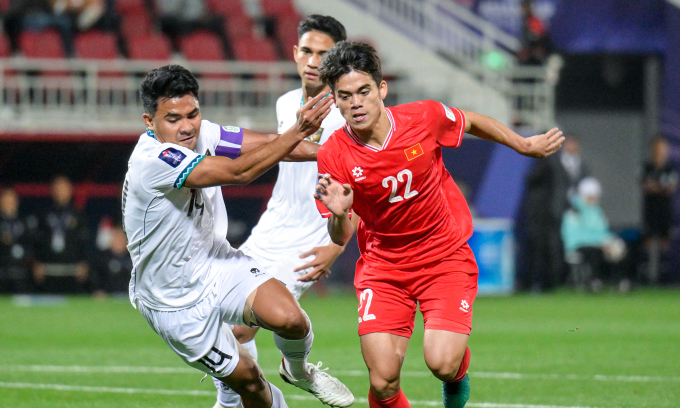Indonesian defender says Vietnam easier to beat now
Asnawi received his first cap in 2017, when Indonesia often struggled against a Vietnam team at the peak of their power, led by coach Park Hang-seo. Indonesia suffered defeats of 1-3 and 0-4 in the 2022 World Cup second qualifiers, drew 0-0 in the group stage of the 2021 AFF Cup, and lost 0-2 over two legs in the semifinals of the 2022 AFF Cup.
However, Vietnam’s performance declined after Park’s tenure, while Indonesia strengthened by adding Dutch-descendant players. This shift in dynamics led to Indonesia’s victories against Vietnam in the group stage of the 2023 Asian Cup and both legs of the 2026 World Cup second qualifiers. In these matches, naturalized players made up more than half of Indonesia’s lineup.
“Naturalized players have positively influenced the team’s performance,” Asnawi told Thailand’s Thairath. “Now it’s easier to beat Vietnam, whereas it used to be very difficult.”
Asnawi Mangkualam (L) tries to win the ball from Vietnam’s Khuat Van Khang in their 1-0 victory at the 2023 Asian Cup. Photo by AFC |
Victories over Vietnam marked historical milestones for Indonesia, as they advanced beyond the group stage of the Asian Cup and qualified for the World Cup third qualifiers for the first time. From June 2024, Indonesia had 12 to 15 naturalized players, with at least eight in the starting lineup. This helped them secure six points in the 2026 World Cup third qualifiers, surpassing Vietnam’s previous record of four points.
Indonesia managed draws with Saudi Arabia (1-1), Australia (0-0), and Bahrain (2-2), a loss to China (1-2) and Japan (0-4), before beating Saudi Arabia 2-0. Coach Shin Tae-yong’s team is currently third in Group C of the third round, tied with Saudi Arabia, China, and Bahrain, and trailing second-placed Australia by just one point. If they maintain this position over the remaining four matches, Indonesia will realize the goal of securing a spot in the fourth round.
Asnawi believes that players of mixed heritage also boost the morale of local players. “The team’s spirit and confidence have improved significantly, which greatly benefits the national team,” he said.
The 1999-born defender noted that Indonesia, Vietnam, and Thailand share the common goal of qualifying for the World Cup. When asked which team might achieve this first, Asnawi confidently stated it would be Indonesia, as the team is “progressing steadily and boasts many quality players.”
However, Indonesia will not field their strongest squad for the upcoming 2024 AFF Cup.
Coach Shin Tae-yong has called up 33 players, primarily from the U21 age group, with only Asnawi Mangkualam (25) and Pratama Arhan (22) exceeding that age. The roster includes only three naturalized players: defender Justin Hubner, midfielder Ivar Jenner, and forward Rafael Struick. Additionally, five senior players have been selected, who are Muhammad Ferarri, Marselino Ferdinan, Arkhan Fikri, Hokky Caraka, and Ronaldo Kwateh.
 |
Dutch-born midfielder Jay Idzes (number 4) celebrates a goal in Indonesia’s 3-0 victory over Vietnam in the 2026 World Cup qualifiers. Photo by Read/Giang Huy |
Team manager Sumardji cited three reasons for sending the U21 team to the AFF Cup. First, as the AFF Cup is not an official FIFA event, clubs are not obligated to release players. Second, it is coach Shin’s decision after careful consideration of strategy. Lastly, the team aims to develop the next generation of players in preparation for the 33rd SEA Games.
Indonesia might not be as competitive in the 2024 AFF Cup with this line up, especially against Vietnam in Group B. However, Sumardji insisted that Indonesia are not attending the tournament just to gain experience. “The minimum goal is to reach the final,” he said.
The team gathered in Bali on Nov. 27, a day later than planned due to the election schedule. They will have 12 days to train before their opening Group B match against Myanmar on Dec. 9. Subsequent matches include Laos (home, Dec. 12), Vietnam (away, Dec. 15), and the Philippines (home, Dec. 21).
The AFF Cup will be renamed the ASEAN Cup starting in 2024, running from Dec. 8, 2024, to Jan. 5, 2025. Ten teams will be divided into two groups, playing two home and two away matches, with the top two from each group advancing to the semifinals. From this stage onward, matches will be played over two legs, without the away goals rule.
Over 14 tournaments, Indonesia have reached the final six times but have always finished as runners-up. Thailand lead with seven titles (1996, 2000, 2002, 2014, 2016, 2020, 2022), followed by Singapore (1998, 2004, 2007, 2012), Vietnam (2008, 2018), and Malaysia (2010).


Comments are closed.